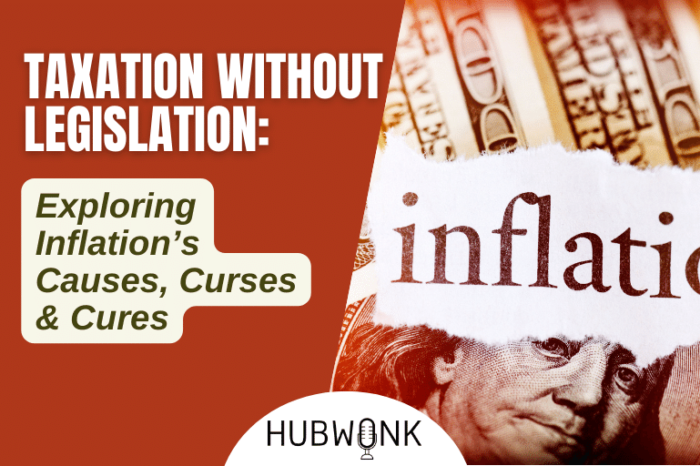Taxation Without Legislation: Exploring Inflation’s Causes, Curses & Cures
/in Economic Opportunity, Featured, Podcast Hubwonk /by Editorial StaffHubwonk host Joe Selvaggi talks with Bloomberg Columnist and National Review Editor Ramesh Ponnuru about the reasons for the sustained spike in inflation, its impact on savers and consumers, the possible policy remedies, and the likely intensity and duration of this cycle.
Guest:
 Ramesh Ponnuru is Editor of National Review, where he has covered national politics and policy for 25 years. He is also a columnist for Bloomberg Opinion, which syndicates his articles in newspapers across the nation. He is a visiting fellow at the American Enterprise Institute and he serves as a contributing editor to National Affairs, the quarterly journal of conservative ideas. His articles are frequently published in The Wall Street Journal, The New York Times, and The Washington Post. In 2015, he was included in the “Politico 50,” Politico’s list of “the thinkers, doers, and dreamers who really matter” in American politics. In 2014, Ponnuru contributed to and (with Yuval Levin) edited the book Room to Grow: Conservative Reforms for a Limited Government and A Thriving Middle Class. New York Times columnist David Brooks called the book “the most coherent and compelling policy agenda the American right has produced this century.” Ponnuru was subsequently featured in a New York Times magazine cover story about reform-minded conservatives. In 2013 he was a resident fellow at the University of Chicago’s Institute of Politics. He is a regular speaker on policy, politics, and constitutionalism at the nation’s leading college campuses and law schools. He also appears regularly on television programs about public affairs. He is the author of a book on the sanctity of human life and American politics and of a monograph on Japanese industrial policy. Previously he has been a columnist for Time magazine and WashingtonPost.com. Ponnuru grew up in Kansas City, Kansas, and graduated from Princeton University. He now lives in the Washington, D.C., area with his wife and three children.
Ramesh Ponnuru is Editor of National Review, where he has covered national politics and policy for 25 years. He is also a columnist for Bloomberg Opinion, which syndicates his articles in newspapers across the nation. He is a visiting fellow at the American Enterprise Institute and he serves as a contributing editor to National Affairs, the quarterly journal of conservative ideas. His articles are frequently published in The Wall Street Journal, The New York Times, and The Washington Post. In 2015, he was included in the “Politico 50,” Politico’s list of “the thinkers, doers, and dreamers who really matter” in American politics. In 2014, Ponnuru contributed to and (with Yuval Levin) edited the book Room to Grow: Conservative Reforms for a Limited Government and A Thriving Middle Class. New York Times columnist David Brooks called the book “the most coherent and compelling policy agenda the American right has produced this century.” Ponnuru was subsequently featured in a New York Times magazine cover story about reform-minded conservatives. In 2013 he was a resident fellow at the University of Chicago’s Institute of Politics. He is a regular speaker on policy, politics, and constitutionalism at the nation’s leading college campuses and law schools. He also appears regularly on television programs about public affairs. He is the author of a book on the sanctity of human life and American politics and of a monograph on Japanese industrial policy. Previously he has been a columnist for Time magazine and WashingtonPost.com. Ponnuru grew up in Kansas City, Kansas, and graduated from Princeton University. He now lives in the Washington, D.C., area with his wife and three children.
WATCH:
Get new episodes of Hubwonk in your inbox!
Read a Transcript of This Episode
Please excuse typos.
Joe Selvaggi:
This is Hubwonk. I’m Joe Selvaggi.
Joe Selvaggi:
Welcome to Hubwonk, a podcast of Pioneer Institute, a think tank in Boston. Inflation has eclipsed the COVID epidemic as Americans’ greatest concern. Having not seen an inflationary spike for nearly four decades, many current consumers and market actors are unfamiliar with its causes, its effects and the potential remedies available to policy makers to bring it back under control. Indeed, what had been thought to be a temporary phenomena, attending the aftermath of a pandemic. Now X us daily, as we shop for eggs, gas, or a potential new home, will this ubiquitous rise in the price of everything continue and perhaps accelerate or can policy makers in our us legislature and federal reserve bank slow and reverse this trend with interventions that voters will accept. My guest today is Ramesh Ponnuru, columnist for Bloomberg and editor of National Review. Mr. Ponnuru has written extensively on the causes and risks of inflation and on which politically viable actions policy makers can take to contain the current trend. Mr. Ponnuru will share with us his views on the origins and contributors to our current inflation, who is most likely to suffer from its effects and which potentially painful policy choices are available to cool this overheated economy. When I return, I’ll be joined by columnist and editor Ramesh Ponnuru.
Joe Selvaggi:
Okay, we’re back. This is Hubwonk, I’m Joe Selvaggi and I’m now pleased to be joined by Bloomberg columnist and editor of National Review Ramesh Ponnuru. Welcome back to Hubwonk, Ramesh.
Ramesh Ponnuru:
Thanks for having me.
Joe Selvaggi:
Okay. Now our topic is one that’s at the top of mind for nearly all Americans, we’re gonna be discussing inflation its causes its effects and perhaps give our listeners a sense of how we might plan to address it. But so let’s start at the beginning first for the benefit of our listeners, what is inflation?
Ramesh Ponnuru:
So different people have defined inflation in different ways and sometimes get quite upset with you if you don’t use the term the way they want to. I think the most intuitive and common way is also the most useful. And that is to describe inflation as a general rise in the price level. So if on average prices were at a hundred in 2020, and then they get up to 102 in 2022, assuming in 2021, then you’ve got 2% in place year over year.
Joe Selvaggi:
Okay. Is there a general sense of what it should be? Is there a sort of a, a background of you know, we, we should always have it, but it should be at this level.
Ramesh Ponnuru:
So this too is a source of contention central banks around the world, starting in the late eighties, have largely converged on the idea of 2% inflation each year, being the ideal or the, the target that they ought to be striving for. It’s a little bit arbitrary, but the idea is that that creates a reasonable amount of price stability while also for you allowing for different kinds of adjustment to take place.
Joe Selvaggi:
So in your first answer, you talked about you know, the average price of everything being a hundred is sort of a, an imagine conceptual concept. And now it’s 102. That means it’s essentially a higher price for the same exact basket of goods. And no change such as a commodity, like a gallon of gasoline is a gallon of gasoline from one year to the next, if it costs more that’s inflation, if it, if it’s across the board, right. Now if, if all boats are rising in inflation is increasing the price of everything, wouldn’t, it also affect the cost of labor, which is a the flip side of, of inflation, which would effectively mean my paycheck. Your paycheck would go up by the same amount. Does the rise in the income negate the effect of inflation?
Ramesh Ponnuru:
Yeah. Well, first of all, just to talk about one of the things you said about changes in quality where, you know, so the idea that it’s 2% inflation costing a hundred and then costing a hundred, two assumes, you’ve got the same basket of goods, but of course there can be all kinds of things that change. So if you know, the size of the candy bar you’re buying shrinks basically that’s a kind of hidden kind of inflation, right? If the price is still the same people call it shrink inflation. Sometimes they do try in these statistics to capture that kind of change. Also if the price of apples goes up maybe people switch over to oranges and there are technical disputes about how you correct for that kind of substitution effect. If, if people can avoid some of these price increases, now you’re absolutely right.
Ramesh Ponnuru:
That wages are another price, the price of labor that is affected by inflation. And if you’ve got a steady and predictable 2% inflation year after year after year, the idea is that wage rates will adjust that people who wouldn’t have gotten raises will get a 2% raise people who would’ve gotten a 2% raise will get a 4% raise as sort of it’s everybody in the economy just expects the price level to be a little bit higher next year than it was this year. But of course, that sort of a textbook model of the way inflation works and, and actuality inflation doesn’t work that way, particularly when you’ve got unanticipated inflation, where maybe it takes some time for this inflation to permeate every market, including the labor market. And during that period in between, if you’re a wage earner, you’re finding the purchasing power of your paycheck going down. And of course there are other kinds of there are other things that can happen with inflation that that, that cause the price of the products you buy to rise, but don’t help your wages. And that’s the case with a supply led inflation, an inflation that is caused by a blow to your productivity.
Joe Selvaggi:
I see. So, so inflation doesn’t raise all boats. Sometimes it it’s an uneven rising if you are either let’s say not an income or earlier you’re maybe fixed income retiree you’re a saver your savings don’t grow with inflation. So you may be left behind. Oh, so let’s talk about that. What are some of the primary negative effects of inflation in, in conceptually?
Ramesh Ponnuru:
So the loss of purchasing power of course, is the one that is closest to everybody’s mind, but it also makes the economy less predictable. If you’ve got an unsteady inflation. And so that makes it harder for businesses to make investment plans, for example, or for households to make long term plans. They don’t have that steady backdrop against which they can make the plant. There’s also what’s called menu costs. And just think about it very literally like the the restaurant has to keep changing the menu because prices keep changing. There’s the way that inflation is baked into some taxes now that’s better than it used to be. In the seventies, when we had our last big bout of inflation, the income tax brackets, weren’t indexed for inflation. So people would find themselves paying higher taxes, even when they weren’t getting ahead in real purchasing power of their income. But it’s still part of our tax code and things like capital gains. So you can end up paying a capital gains tax when you haven’t in real terms, made any capital gain and the effective tax rate therefore keeps going up. So there are all kinds of costs that ripple out through the economy.
Joe Selvaggi:
Okay. So let’s ask the, you know, let’s get into the meat of this. We know what inflation is. This is a harder question. What is it that causes inflation? You’ve already mentioned a supply shock but let’s go deeper into that. What, what I’m sure it depends on who you ask, but what causes inflation?
Ramesh Ponnuru:
Well, the typical cause of inflation is an excessive growth in the money supply, but really anything that increases the total level of spending is going to cause a demand side inflation that’s most of what we saw in the 1970s, that’s part of what we’re seeing now, if there’s, you know, the, the, the famous definition of inflation or explanation for inflation is too much money chasing too few goods. Now, the too few goods, that’s the supply side of the problem too much money. That’s the demand side that is the central bank running a monetary policy that is too loose that is leading, you know, to too much currency in circulation. For example would be the very classic case of of how a central bank can go wrong with inflation. And another metaphor people often use for this kind of inflation is overheating the economy.
Joe Selvaggi:
I see. So you’ve mentioned a couple things, I think that you we’re, we’re both a channeling Milton Friedman there with the too, too many, too many dollars chasing too few goods. So let’s analyze that equation. We’ve got too many dollars and too few goods. Let’s start with the too few goods. We all know that we have supply chain issues. We’ve covered that on this podcast in earlier episodes, but let’s, let’s analyze that. Are we still blaming too few goods on supply chain shocks that were a result of our recent pandemic?
Ramesh Ponnuru:
I think that that was a bigger cause of the inflation in the first half of 2021. And it is a, a pretty big cause of the inflation that we’re seeing in Europe. But it’s been less of what has been afflicting us for most of the last year, so still a factor. But but since mid 2021, I would say too much spending has been a bigger part of it. And by too much spending, I mean, really the total level of spending throughout the economy, all spending on consumption and investment public and private and business it’s you know, you want that growing at a steady rate and it hasn’t been a, it dropped substantially at the beginning of the pandemic then it rose sharply. And I think some of that sharp rise is justified as a way of catching up after you had that big drop. But it’s been excessive and and it’s been, I think clearly excessive since late 2021. And the central bank has been, has been too slow to arrest that.
Joe Selvaggi:
I see. So we’re talking about a constraint in supply and then an attending inflow of, of spending. So again we hear a lot about energy constraints price of gas is front top of mind for everyone. I think it’s gone up 50% in the last 18 months. The administration is calling that the Putin price hike and of course energy gas is an input for all other goods. Can we attribute some of this inflation to spike in energy price?
Ramesh Ponnuru:
Yeah. absolutely. We can. It’s, that’s typically the case. But of course gas prices were rising before Putin’s invasion of Ukraine. I think there’s no question that that invasion has made things worse, but we had an inflation problem before it, and the excess spending problem is not a Putin caused problem. It’s you know, that, that is a domestic policy problem. That’s a central bank problem. The, you know, what you, the point you made about gas prices being energy, being an input into almost everything else, that’s a very important point. Because sometimes people will say well, you know, one price goes up. People can just you know, spend more on that and spend less on other things and shouldn’t change the overall inflation rate. And that’s really not true when it comes to some, an input price that has a negative effect on productivity, like an increase in energy.
Ramesh Ponnuru:
It’s like making everything, you know, if you make everything twice as hard to make, like take twice as much labor to produce the same amount of products, you’re gonna have less output and, or higher prices. And there’s not a whole lot that a central bank can do about that. So all just a way of saying that the input price issue is absolutely part of this problem. And we, you know, we just have to be able to hold in our minds that we’ve got both a supply and a demand problem, and, and too often people wanna make it one or the other Democrats typically wanna make it an entirely supply issue as though that absolves them of any responsibility you know, which it actually doesn’t. But it’s also not true. It’s both.
Joe Selvaggi:
So, so, okay. Let’s let’s move off of the supply side and towards the demand side, you’ve already cited the fact that a lot of people through the pandemic were sitting home not spending money. They couldn’t spend money, they were stuck at home perhaps saving and they would naturally want to make up for lost time when when restrictions are lifted and we can all get back out there. So we’ve got that spike in demand as you describe. But there was also of course a stimulation of that spike in demand by the federal government in many ways. It it influenced our ability to spend their direct outlays debt, forbearance, unemployment supplements payment protection programs, all kinds of alphabet soup of stimulus. Of course that’s introducing the idea of far more dollars chasing the same number of goods. Is that to what degree is the federal government’s fiscal policy to, to blame for the stimulation in demand?
Ramesh Ponnuru:
Well, here, I think it’s a complicated story and I thought that a lot of the spending that the federal government engaged in in 2020 and particularly in early 2021 with president Biden’s so-called American rescue plan was excessive. And I thought it was excessive for a variety of reasons, mostly having to do with wasting money that could have been more productively spent elsewhere in the economy and creating bad incentives. But I, at the time, you know, even though I was opposed to Biden spending plan, I thought it wouldn’t have a big effect on inflation, partly because changes in spending over the previous decade, hadn’t had a big effect on total spending levels or on inflation because it had been offset. You know, if, so, for example, in early 2013, you’d had some spending cuts from the federal government and some tax increases and the central bank offset that so that so that the overall effect on the economy wasn’t very big this time that didn’t happen because the central bank was simultaneously engaged in a kind of loosening of policy under J Powell you know, partly loosening be, you know, as a, as a response to the pandemic and the effect on the economy, they, they thought it was the right thing to do.
Ramesh Ponnuru:
But the, the combined effect of this fiscal and then monetary loosening was excessive. And and that’s how we got here. And I also think feel permit me a little political digression. One of the reasons that the, the federal reserve let things get out of control in the second half of 2021 was there was uncertainty about the leadership of the federal reserve itself because Biden had not committed to renominating Powell. And there was a great deal of pressure from the left and the left typically doesn’t like monetary tightening likes monetary loosening and the democratic incumbent is definitely going to not want interest rate hikes. And I think that can help explain some of the delay in responding to the clear signs that not only did you have inflation, but this inflation was not transitory. And this inflation was in fact fed by excessive demand, excessive spending.
Joe Selvaggi:
So, I mean, you, you, you say that rates or have a political valence, but I think what you you’re really trying to say is for incumbents, not for left or right. Or Republican or Democrats, right. And all incumbents want low interest rates and a, and a let’s say a, a heated, perhaps not overheated, but a heated economy. Nobody wants to, well, I
Ramesh Ponnuru:
Think, I think it’s
Joe Selvaggi:
Afraid,
Ramesh Ponnuru:
Right? Yeah. I think it’s both in this case. I, I do think presidents just typically they want low interest rates. They don’t wanna have the risk of a recession from an increase in interest rates. President Trump was certainly a low interest rate person which also I think has to do with his background as a real estate developer. But I think that there’s also this additional ideological overlay, which is that the left tends to favor looser policy than the right. And tends, tends to think a little more inflation is more tolerable than the right does. Now I think that this is actually in, particularly in this case, a mistake that Biden and the Democrats would actually be better off if we’d started this tightening cycle in late 2021 and gone a little further in that.
Ramesh Ponnuru:
I think we’ve actually got a pretty strong labor market if you look at vacancies and employment growth and the economy could have withstood that, and you’d be better off as the party in power with inflation under greater control. I mean, you might be facing some losses anyway, because you’re coming into a midterm midterms, typically don’t go well for the party in power. But I don’t think you’d be, you’d be seeing the potential catastrophe that task that Democrats are now seeing, where I think, you know, in a very real sense, inflation is just devouring this presidency.
Joe Selvaggi:
So let’s again, so again, the, the partying power is uncomfortable with the levels of inflation. We’re all seeing right now. It’s not good for their prospects in November, but let’s, let’s dispense with some of the, or not dispense with some of the narratives that are coming from the, the democratic party. A lot of people blame inflation on the exploitation of sellers or
Ramesh Ponnuru:
Oh, right. So called
Joe Selvaggi:
Yes. Breeded of corpor. We have, it’s a our own Elizabeth Warren she’s our Senator, or one of our senators who has a wonderful creative port mano called greed, FL that, that essentially this is suddenly corporations has become greedy just recently. So is there any merit tore inflation?
Ramesh Ponnuru:
Well, I mean, I think you’ve hit on the major problem with it, which is that it, it, it attempts to explain a variable by reference to a constant companies. They’re always trying to maximize their profits. It’s not like we had low inflation for most of the last decade because companies decided, you know, we don’t actually care about making profits anymore. So something has to have changed where a bunch of companies, you know, all through the economy all at once decided that the way to do that was to raise prices. And and I think that once you start thinking in those terms, you, you just see how how pitifully inadequate Senator Warren’s explanation is. You know, she’s, she has responded to this inflation by introducing legislation that would prohibit large companies from, you know, I think the, the phrase is unconscionably excessive price increases.
Ramesh Ponnuru:
Well, what does that mean? Who would define it, how much litigation would be involved in that? But also if you look into that legislation so she’s, she says, you know, you, yeah, you’re allowed, you know, if the bureaucrats decide essentially that you’ve got a supply chain problem then okay, you can raise your prices enough for that. But implicitly, what they’re saying is you can’t raise your prices in response to changes in demand which is nuts. And and, and, you know, local market economy just can’t function. If companies aren’t allowed to set prices in response to changes in both supply and demand in their markets.
Joe Selvaggi:
Indeed. you know, we, we probably could do a whole podcast on the downside of price controls and why, why they lead to bread lines, but let’s move away from that. And talk about the other way the democratic party right now is deflecting from this concern about inflation saying, look, we’ve got inflation, but so does the rest of the world, we’re looking at Europe, they’ve got inflation Biden, certainly hasn’t and affected their policies. How is it that we would be blamed for something that is a universal phenomena?
Ramesh Ponnuru:
So there are two things that bear watching. One is there is, I think just kind of you’ve got some of the same policies being pursued everywhere. So I think European central bank policy was also too expansionary. And I think though we’ve also got a little bit of, of a coincidence because you’ve got a bigger supply problem in Europe right now. And you’ve got a bigger demand problem here in the United States. So you’ve got the same sort of a very similar kind of headline inflation number, but very different causation in both cases and different policy responses are called for in different degrees in each of the cases that was, you may not have sent it up, but that was all explanation one explanation two. I do think there is something to the idea that the United States is the world’s monetary superpower and that if it’s deflationary or inflationary, that tends to get exported to other parts of the world for reasons having to do with, you know, for example, other currencies being pegged to the dollar. But but I think that you know, there’s, there’s something a little screwy about the leadership of the United States saying well, this is a global economic problem. It’s not our responsibility. I mean, we’re the United States.
Joe Selvaggi:
Right, right. Indeed. So, so let’s let’s move away from we’ll accept and stipulate that we do have it. It is here. We do think we can have policy choices that will make differences, but let’s start with we’re coming out of the COVID 19 pandemic. Thank God. And theoretically supply chains will go back to normal will that likely happen and, and be let’s say saluatory to those hoping to reduce inflation. In other words, if we resume our supply, will the demand for that short supply normalize and you know, that will battle inflation.
Ramesh Ponnuru:
Yeah. I think that that as supply chains get UN snarled, I mean, unless there are more shocks, right. Because we, you know, we had the pandemic shock and we had the Russian invasion shock and the world might not be through with shocks. You know, there was concern, I think it basically hasn’t panned out, but there were concerns that the, the resurgence of the pandemic in China would cause big supply problems. And so you, you can’t rule that sort of thing out, but but one of the things about supply shortages is that they should, I mean, there are powerful market forces that act to fix those and that should happen over time and that should reduce that level of or that cause that kind of inflation, but you’ve still got the demand problem and the excessive spending is not something that gets fixed just because supply chains get fixed.
Joe Selvaggi:
So, okay. Then let’s shift it, even if we do have plenty of supply, we’ve got too much money still. Right. I think we have senators mansion and cinema to thank for the fact that we don’t have an additional three or $5 trillion in a build back better that was not passed, but quite a bit of stimulus was in the trillions, I believe another 5 trillion in sort of pandemic stimulus. That’s still filtering down is that stimulating helicopter money going to continue to overstimulate us well into the future. Is it, you know, if we turn off the SPT, how long will it take to again, normalize?
Ramesh Ponnuru:
Well, I think that you know, obviously it takes time for some of these changes, both positive and negative to work their way through the economy. And so, you know, the people call people say that monetary policy has the, the phrase everybody uses who studies this is like long and lagging effects. It’s however, I think some of the effects would be a little faster than that. You know, the signals to financial markets that the fed is serious, if it raises rates enough to give the markets jolt that shows up in you know, as we’ve seen, some of that shows up in asset prices. Some of that shows up in just market expectations of future inflation and when markets don’t expect future inflation to be so elevated in that in itself has a solitary effect because people aren’t trying to raise their prices to keep up with with what they see coming for them. So, so I think that, that a good policy change could have quicker effects than people sometimes think.
Joe Selvaggi:
So we’re talking specifically about monetary policy. We’re talking about the, the fed drone Powell we’re actually recording on June 15th before the two o’clock announcement of rate increases. So we, we can speculate here, but our listeners will know what the outcome was. Well, the, I think odds on favor are for a 75 basis point increase for the benefit of our listeners. How is it that this change in rates could have an effect, hopefully have an effect on dampening inflation? How, how is it effect that we’re making money more, more expensive? How does that filter through the economy and then right. Ultimately tame inflation?
Ramesh Ponnuru:
Well, there’s a mechanical effect. In for example, you know, it cools the housing market if interest rates are higher people are not as, as quick to purchase homes and to bid the prices of homes higher. So there’s that effect on inflation. And then that also affects rents. But I actually think that that the biggest effect is, is, is simply the expectations that when people have confidence that the federal reserve is going to do whatever it takes to get inflation back under control, that’s the most powerful effect that the fed has. And in fact, the more confidence there is the less actual interest rate increases the fed has to engage in. It’s a lot of what the fed has to do is is changing market expectations. It’s just like, sort of, you know the primary way that traffic signals green and red lights work is not through police tickets, right?
Ramesh Ponnuru:
It’s it’s, it’s just changing the way, you know, drivers act and it’s it’s not, self-regulating right, it’s the government setting up those traffic signals. But it’s it’s a kind of nudge to market participants to act in a particular way and to have certain expectations and expectations of what other people are doing on the road. So to here and in a lot of what I think went wrong for the fed last year was that it was sending the wrong signals about its intentions and and how committed it was to keeping inflation from getting out of control in the first place.
Joe Selvaggi:
So I think you’ve anticipated, I was gonna ask how high does the fed have to raise interest rates to essentially tame it, but your, your answer, I think I’m going to guess is it has to raise it a lot less. If everybody accepts the fact that it’ll do anything, it takes to raise interest rates. So if, if you don’t believe, if you believe that the fed is on it, and then they’re doing their job and they plan to do their job expectation for inflation, go down, ergo rates don’t have to go up quite as high as they would otherwise. Is that right?
Ramesh Ponnuru:
Yeah, that’s right. And one of the reasons I think that the fed opts to surprise the markets on the upside, by having a little bit higher of a rate increase than people expect right now is so that they don’t have to keep doing it. So that maybe that, that ends up being enough to convince people that that this is, this is the end or the beginning of the end of this burst of inflation.
Joe Selvaggi:
So we we’re running outta time, but I did, I do wanna get to the sort of historical you you’re trained as a historian. So I thought I’d ask in a historical question, we did reference the seventies and what happened then I’m old enough to remember but I wasn’t buying houses at that time. I was playing on the, you know, schoolyard, but back in the late seventies, early eighties, we had rampant inflation and then chairman Volker came out and essentially tackled a, an extreme bout of inflation with interest rates you know, then double digits. Would we, are you concerned looking back as a historian at that bout of inflation really the last time we, we were here that we will see that kind of pain because of course those kinds of interest rates cause enormous amounts of unemployment and, and recession, are we inclined to have to go that far and be you know, it, will it be that painful going forward if in your view,
Ramesh Ponnuru:
I think we ought to be able to avoid that degree of pain because we gotta remember that the inflation of that period took quite a while to develop. And it took a while for people’s expectations, excuse me, of inflation, to shift upward on a sustained basis. So you started seeing that increased inflation in the late sixties and then policymakers sort of flailed around in response for more than a decade. Right now, if you look at long term inflation expectations, if you look at measures of what the market is expecting inflation to be six to 10 years from now, there’re a little high. I think the fed needs to bring them down, but they’re not wildly high. And if you look at that, which means that the fed doesn’t have to to really upend people’s expectations, it just needs to moderate them, bring them down a little bit, and you combine it with the fact that the labor market’s in, in pretty good shape to start with those things, suggest to me that if the fed does the right thing now we can have, if not the sort of soft landing, we have a tightening cycle that doesn’t result in a recession, but if you do have a recession, maybe it can be mild and short.
Joe Selvaggi:
All right. So we’ve talked about many of the levers that government has to, to combat of inflation. We’ve talked about how it exacerbated inflation, but we’re now trying to turn the ship around in your view, given the government, we have the upcoming midterm elections and, and the policy choices that are on the table for those politicians who wanna remain in, in in office. What other levers do you see that we could be pulling to mitigate the effects of inflation and inflation expectations?
Ramesh Ponnuru:
Well, I think there are an enormous number of government policies that have an effect on productivity and it’s typically a negative effect on productivity. And if you simply lifted some of those burdens you would contribute to the long term productivity of the economy, which is just a good thing to do in general. And that would also put some downward pressure on prices. Not all of it would be quick and immediate but some of it would. So for example, reducing tariffs would particularly if you reduce tariffs on critical inputs like the things you use to make semiconductors that would, I think have a pretty quick effect and put some downward pressure on prices. You know, if you increase domestic energy production, got rid of some of the restrictions on that, that would also have an effect. And maybe some of that would even feed into today’s prices because it would affect people’s expectations of future prices and future supply levels.
Ramesh Ponnuru:
You know, we had this huge infrastructure bill that was supposed to make our economy more, more productive, but there’s language in that bill at the behest of Democrats that prevents you from using any of it to automate the ports, which is something that we ought to be doing to make supply chains more efficient, but that unions naturally dislike. And so Democrats won’t go for the problem that you come up against again, and again, is there’s either an ideological objection or some kind of political interest group objection. And the natural instinct of the democratic party is always restrict supply through regulation, subsidized demand, through spending that’s a recipe for more inflation. And it makes it very, very hard for them to respond to inflation in a way that actually helps solve the problem.
Joe Selvaggi:
So so we can’t blame it all on Democrats, I suppose also Republicans resist Donald Trump in particular was a fan of tariffs you know, and protecting American jobs. What you’re saying is free trade is one of the main remedies for fighting inflation including, you know, facilitating that free trade through ports and, and such, is that what you’re saying?
Ramesh Ponnuru:
Well, I wouldn’t necessarily say it’s one of the main remedies, but it’s one of the, it is a remedy and it is something that could be done. I mean, the president could do a lot of this with a stroke of a pen because a lot of the tariffs were imposed by the stroke of a pen. And so if you really think that inflation is a huge threat, I think you try to attack it on all fronts and you do the things that you can do
Joe Selvaggi:
Indeed. All right. So we’re getting close to the end of the time together. I don’t know if you wanna dust off your crystal ball right here. I’ll ask you the $64,000 question. How high do you think inflation will go? I think we’re looking at headline inflation of 8.6%. That was of Friday last week was what annualized inflation rate how high can it go and how long do you think it’ll last?
Ramesh Ponnuru:
Well, I don’t try to make predictions especially about the future, cause I think Yodi said but I, I, my sense has been that policy has consistently been a little bit too little too late. I would like to be pleasantly surprised, but I think that we are going to have this elevated inflation level for some time. So I, I think we’re gonna have it into 2023,
Joe Selvaggi:
Indeed. Okay. So sort of a grim outlook, but at least it, it is temporary. Depends your timeline. It will end and so you you’ve called it 2023 is when we start to see the light at the end of the tunnel. I’ll I’ll, I’ll take that to the bank. Thank you very much for joining us today. And Hubwonk. Ramesh, you’re always a welcome guest and a font of information. Thank you for joining us.
Ramesh Ponnuru:
You’re most welcome.
Joe Selvaggi:
This has been another episode of Hubwonk, a podcast of Pioneer Institute. If you enjoy today’s episode, there are several ways to support the show. It would be easier for you and better for us. If you subscribe to Hubwonk on your iTunes podcaster, it would be easier for others to find hub won. If you offer a five star rating or a favorable review, we’re always grateful. If you want to share Hubwonk with friends. If you have ideas for me, or suggestions or comments about future episode topics, you’re welcome to email me at Hubwonk@pioneerinstitute.org. Please join me next week for a new episode of Hubwonk.
Recent Episodes
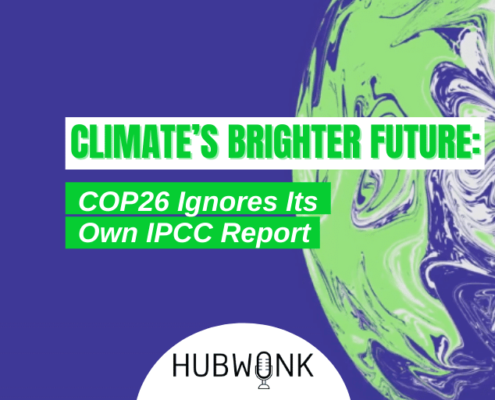
Climate’s Brighter Future: COP26 Ignores Its Own IPCC Report
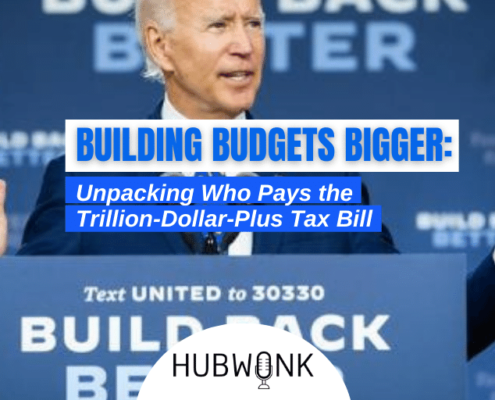
Building Budgets Bigger: Unpacking Who Pays the Trillion Dollar Plus Tax Bill

Supply Chains Understood: Covid’s Global Demand Stress Test
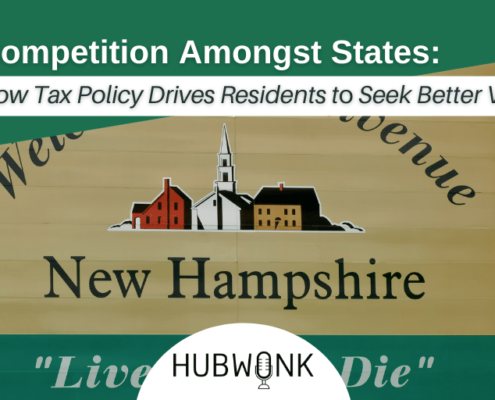
Competition Amongst States: How Tax Policy Drives Residents to Seek Better Value
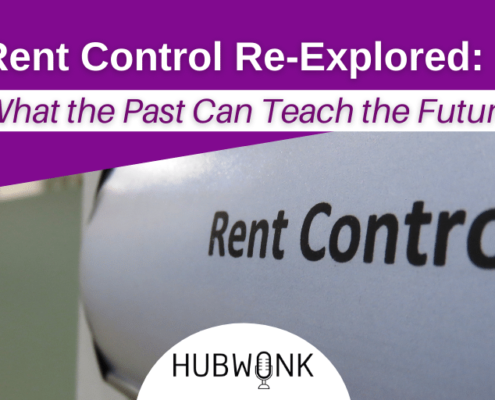
Rent Control Re-Explored: What the Past Can Teach the Future

Defusing Ideological Tribalism: Methods for Communicating Across Political Language Barriers

Marathon Endurance Test: Leaders Pave the Way for Boston’s Return


